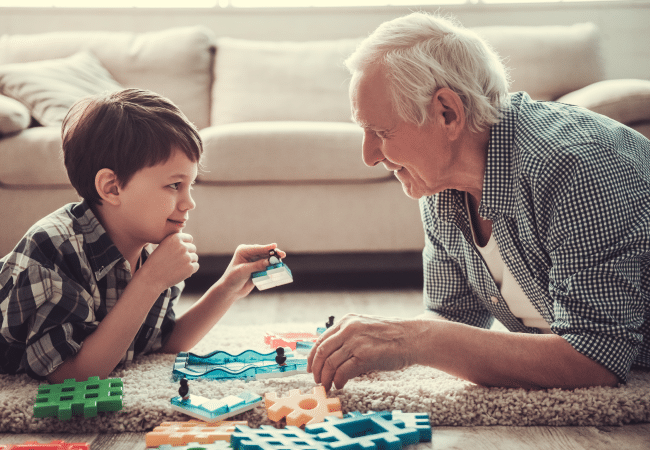Intergenerational Learning

By Máire Corbett
Anne Fitzpatrick, of the Together Old and Young Intergenerational Learning (IGL) project has published a lovely handbook about the benefits of IGL. As I read it this week, my mind kept returning to the Scéalta blog post we published two weeks ago. My colleague Kathleen Tuite spoke about the importance of welcoming parents and indeed grandparents into settings, and finally removing any residue of COVID-19 signs restricting access to families.
In her post, Kathleen discusses the importance of nurturing and welcoming families and cites a grandparent feeling sad and surprised that even though authorised to collect her grandchild from their setting, she was not allowed to enter and see the place where her grandchild plays and has fun every day.
In the publication I mentioned Generations Growing Together: intergenerational learning as a pedagogical strategy in early childhood education and care services, Anne Fitzpatrick discusses the many positive benefits of IGL. She outlines that this is more a process than a set activity, that relationships are key, that the experience should be reciprocal, and crucially for me, that this is an ongoing and sustained aspect of the pedagogy of the setting.
Longer history of the world
I think we have all heard lovely stories of educators from preschools bringing children to visit residents in nursing homes and care homes. We’ve heard about the interests they share and what they can learn from each other. As Anne mentioned in the handbook, the fact is that older people have a longer history of the world. As I read this, I was taken back a few years to a day I was in a setting in Dublin. A conversation arose about how the children had got to the preschool that day. One child wondered how the educator got to preschool when she was a little girl; was it on the Luas, she asked? The children were totally amazed that the Luas wasn’t there when the educator was a child. These experiences help give children a sense of time and that there is a world that exists outside of their own world. Of course, these discussions arise daily, but if children have the opportunities to chat with older people, how much richer and more exciting this learning can be?
How can we embed IGL in pedagogy?
As I mentioned above, key aspects of IGL include the importance of relationships and that need for this to be an ongoing aspect of pedagogy. These are completely interconnected in my opinion. Relationships are built over time and ongoing connection is needed to embed IGL in pedagogy. Visiting other settings (care homes/day care centres) can provide great opportunities but can be challenging to organise very often. So, perhaps we could look to inviting older members of our community into our settings. This could be grandparents of children in the setting but perhaps this can be broadened out to people who are interested in making these connections who do not have a link to the setting. Check the guidance around volunteers/unpaid workers in Tusla’s Quality and Regulatory Framework to ensure that the Early Years Regulations are complied with and that setting ratios of qualified educators are complied with at all times.
Enhancing the setting
These visitors can enhance a setting so much. Older people can share interests such as crafts, cooking, gardening, local history, travel, music, their family cultures and traditions and so much more. But there is also a value to not having a set activity – remembering that the process is so important. I was in a setting many years ago (in the earlier days of regulations) and at school collection time an older lady was with the children as they were being dropped off after school, while dinner was being prepared and the whole group was gathering. She sat and knitted, listened to the children as they chatted about their day, things that had happened, things they liked and perhaps things that upset them or annoyed them. It is so important to have someone hear the stories that children have to tell. Educators have lots of tasks that need to be attended to on a daily basis, but if it is possible to have a ‘social grandparent’, in the setting at times it can bring so many benefits. This concept of ‘social grandparent’ is introduced in the handbook and I think it is a lovely term to describe someone who can forge connections with young children. This is where the reciprocal aspect comes in. The connection to young children can be a huge advantage for older people who may have grandchildren living far away that they cannot see very often.
In conclusion, let me share this quote from the publication: ‘Expanding the circle of those who care for and about children is an important aspect of Intergenerational Learning, reflecting the profound wisdom that it takes a village to rear a child’.
Generations Growing Together: intergenerational learning as a pedagogical strategy in early childhood education and care services can be accessed here http://www.toyproject.net/wp-content/uploads/2024/01/Generations-growing-together_Handbook_final_compressed.pdf









